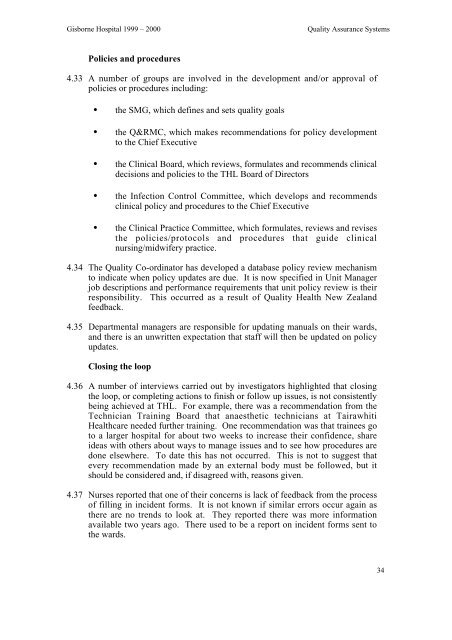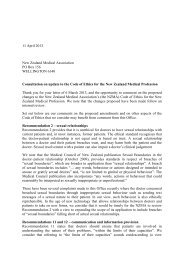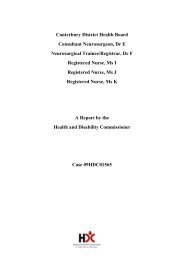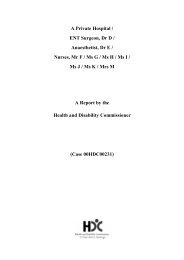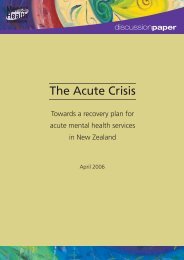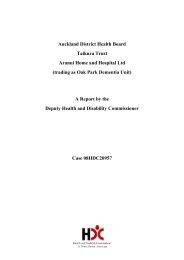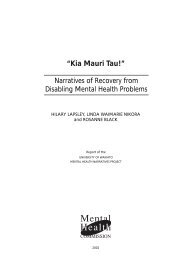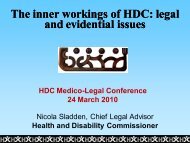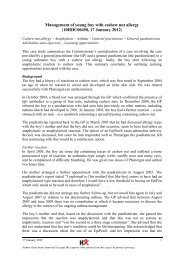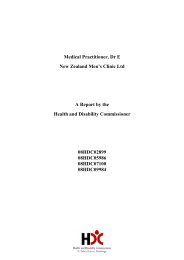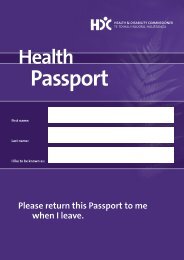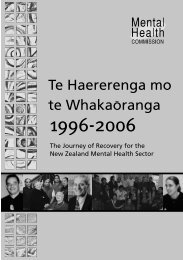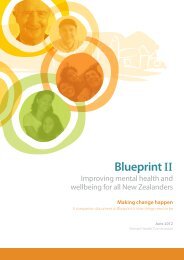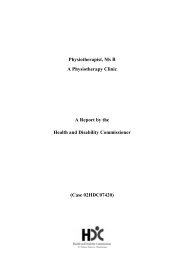Gisborne Hospital Report - Health and Disability Commissioner
Gisborne Hospital Report - Health and Disability Commissioner
Gisborne Hospital Report - Health and Disability Commissioner
Create successful ePaper yourself
Turn your PDF publications into a flip-book with our unique Google optimized e-Paper software.
<strong>Gisborne</strong> <strong>Hospital</strong> 1999 – 2000<br />
Quality Assurance Systems<br />
Policies <strong>and</strong> procedures<br />
4.33 A number of groups are involved in the development <strong>and</strong>/or approval of<br />
policies or procedures including:<br />
• the SMG, which defines <strong>and</strong> sets quality goals<br />
• the Q&RMC, which makes recommendations for policy development<br />
to the Chief Executive<br />
• the Clinical Board, which reviews, formulates <strong>and</strong> recommends clinical<br />
decisions <strong>and</strong> policies to the THL Board of Directors<br />
• the Infection Control Committee, which develops <strong>and</strong> recommends<br />
clinical policy <strong>and</strong> procedures to the Chief Executive<br />
• the Clinical Practice Committee, which formulates, reviews <strong>and</strong> revises<br />
the policies/protocols <strong>and</strong> procedures that guide clinical<br />
nursing/midwifery practice.<br />
4.34 The Quality Co-ordinator has developed a database policy review mechanism<br />
to indicate when policy updates are due. It is now specified in Unit Manager<br />
job descriptions <strong>and</strong> performance requirements that unit policy review is their<br />
responsibility. This occurred as a result of Quality <strong>Health</strong> New Zeal<strong>and</strong><br />
feedback.<br />
4.35 Departmental managers are responsible for updating manuals on their wards,<br />
<strong>and</strong> there is an unwritten expectation that staff will then be updated on policy<br />
updates.<br />
Closing the loop<br />
4.36 A number of interviews carried out by investigators highlighted that closing<br />
the loop, or completing actions to finish or follow up issues, is not consistently<br />
being achieved at THL. For example, there was a recommendation from the<br />
Technician Training Board that anaesthetic technicians at Tairawhiti<br />
<strong>Health</strong>care needed further training. One recommendation was that trainees go<br />
to a larger hospital for about two weeks to increase their confidence, share<br />
ideas with others about ways to manage issues <strong>and</strong> to see how procedures are<br />
done elsewhere. To date this has not occurred. This is not to suggest that<br />
every recommendation made by an external body must be followed, but it<br />
should be considered <strong>and</strong>, if disagreed with, reasons given.<br />
4.37 Nurses reported that one of their concerns is lack of feedback from the process<br />
of filling in incident forms. It is not known if similar errors occur again as<br />
there are no trends to look at. They reported there was more information<br />
available two years ago. There used to be a report on incident forms sent to<br />
the wards.<br />
34


